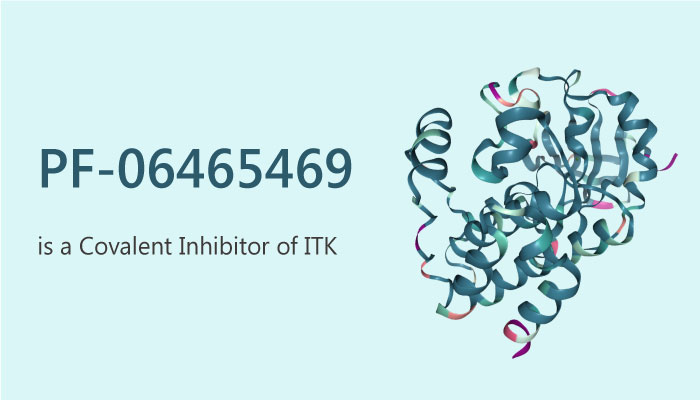Peripheral T-cell lymphomas (PTCL) accounted for about 5% of all non-Hodgkin’s lymphomas. Standard first line treatment is with combination chemotherapy but the majority of patients relapse. There is no standard treatment for refractory or relapsed disease. However, histone deacetylase inhibitors, panabinostat and romidepsin, and pralatrexate are licensed for use in the United States.
Over the past years, the scientist further studied the biology of PTCL. The mutational landscape of PTCL becomes clearer. Mutations in epigenetic modifiers and T-cell receptor signaling molecules are also being characterised. Interleukin-2-inducible kinase (ITK) is a T-cell specific tyrosine kinase, which is essential for signalling from the T-cell receptor (TCR) and also for chemokine induced migration.
A study from Sami Mamand discovered and identified an ITK inhibitor PF-06465469. PF-06465469 is a covalent inhibitor of ITK, with an IC50 of 2 nM. Additionally, PF-06465469 inhibits MEK1/2 or AKT phosphorylation.

In details, in vitro, PF-06465469 shows inhibitory activity for the nonreceptor tyrosine kinase Itk (IL-2 inducible T-cell kinase), which is expressed primarily in immune cells, and is strongly upregulated following activation of T-cells. It also exhibits inhibitory activity against Bruton’s tyrosine kinase (BTK), with an IC50 of 2 nM. The compound blocks anti-CD3 induced phosphorylation of PLCg in Jurkat cells (IC50 = 31 nM) and IL-2 production in anti-CD3 stimulated human whole blood (IC50 = 48 nM).
There have no studies about PF-06465469 on animal models, large numbers of work are need to be carried out. Besides, from the data in this article, we can know that PF-06465469 is a potential compound for the study of Kinase Phosphatase Biology research.